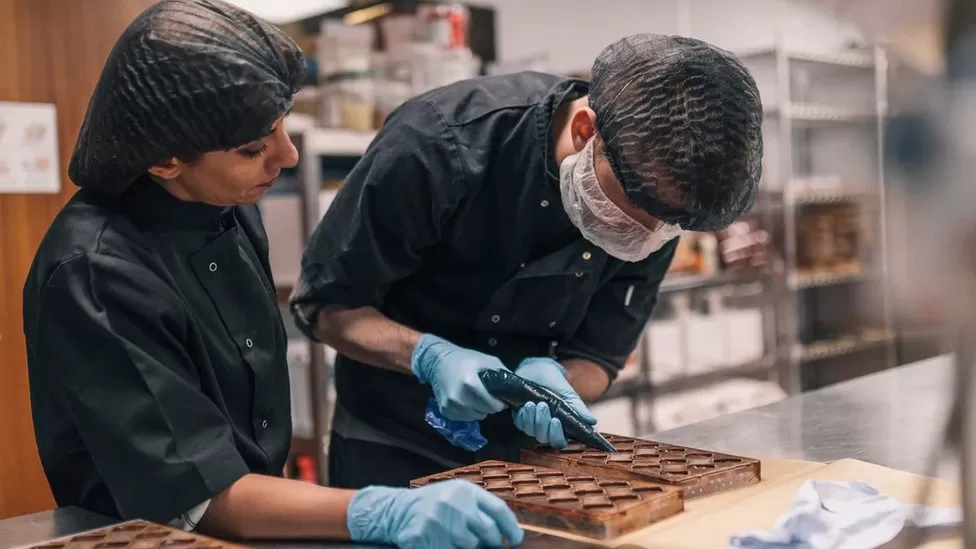A chocolate business set up 10 years ago by a couple to help their autistic son learn about the world of work has grown into a thriving social enterprise. It employs 12 people, the majority of whom are autistic, and offers free work experience to hundreds of youngsters with the condition.
Here, the founders of Harry Specters in Ely, Cambridgeshire – Shaz and Mona Shah – tell us how chocolate has turned their lives around, and some of the autistic workers share their thoughts on the impact of this small family-run business.
The ‘incubator’
Life in their native Pakistan was not easy for Shaz and Mona Shah as they struggled to find support and suitable education for their son Ash, who was diagnosed with autism at the age of three.
“In 2001, people weren’t really aware of autism and Ash didn’t speak until he was nearly six,” says Mrs Shah.
Rejected by most schools, it was “very, very difficult”, and things came to a head when she saw parents dragging their children away from Ash, saying he was “mad”.
“He just wanted to make friends and he didn’t know what ‘mad’ meant – we knew we had to do something.”
Through the UK’s Highly Skilled Migrant Programme, engineer Mr Shah was able to move to England with his wife, son Ash and Ash’s sister Mina in 2006.
The couple secured good jobs, “but we started thinking about the next steps for Ash,” says Mrs Shah.
By chance, she came across a chocolatier – and fascinated, went on a chocolate-making course.
“I recognised the routine and structure in making chocolate and it was also quite sensory,” she says, thinking it would be “perfect for autistic people”.
She began making chocolates at home and Ash and his friends from his special educational needs school loved joining in.
The couple gained funding and their social enterprise – Harry Specters – began to take shape as corporate orders came in.
Social enterprises are businesses that have social change for good as their primary motive rather than profit.
They moved to what is now their factory in Ely, where everyone other than themselves and the packaging supervisor is autistic.
In the UK, one in 100 people are on the autism spectrum and there are around 700,000 autistic adults and children, according to the National Autistic Society.
Looking at statistics, Mr Shah said the couple discovered 85% of autistic people were unemployed but 61% were more than eager to work.
“There is a misconception that autistic people might need a lot of support, but the truth is, everyone needs support in a new job at the beginning,” he says.
“Many businesses don’t realise how hard working and loyal autistic people are. They never shirk their responsibilities and are always asking, ‘What do you want me to do next?’.”
Richmal Maybank, employer engagement manager at the National Autistic Society, says: “Many autistic people are eager to find jobs that reflect their talents and interests, and have a huge amount to offer employers.
“Small changes to the recruitment process and workplace can make a huge difference, such as having a basic understanding of autism and working with autistic employees to find out what works best for them.”
Mr and Mrs Shah quickly realised how important the “routine and structure” of chocolate-making was to their team.
“It can be very calming to someone who is autistic – if you’re doing something you know, and it’s repetitive, you can almost meditate on that,” says Mr Shah.
A number of their staff began with work experience and progressed to full-time jobs, giving them the confidence to move on to other employment.
One former autistic employee was suffering from depression and would barely speak when she arrived, but by the time she left, she would dash across the room to answer the phone because she wanted to talk to people, Mrs Shah says.
That woman is now a successful data analyst.
“We think of this place as an ‘incubator’ – boosting the confidence and morale of people who have so much to contribute,” Mrs Shah says.
‘This is my super power’
Chocolatier Greg Smith, 25, has worked at Harry Specters for about five years.
He began with a work experience trial and then progressed to full-time employment.
“It was my first paid job,” he says.
Starting out in packaging, he is now a fully-fledged chocolatier.
“The journey they’ve taken me on is unbelievable – it’s really changed my life.”
Harry Specters recently won a contract to provide supermarket chain Aldi with bars of their chocolate, having appeared on the Channel 4 show Aldi’s Next Big Thing.
“When we got the contract everyone was ecstatic,” says Mr Smith.
“I’m super proud of every one of the team – without them, I wouldn’t be where I am now.”
He says the company has “really brought out the best in me – it feels like you’re using your disability as a super power”.
Mr Smith works closely with fellow chocolatier Bruce Hall, 20, who first came to the company on work experience six years ago.
He has become known as “the file guy”, as one of his jobs is to check the company’s paperwork is in order.
“Working at the factory is definitely great”, he says, and one of the perks is “getting to eat the scraps”.
‘The office octopus’
Zoey Clenshaw, 32, is the operations executive and is “autistic and proud… very proud”.
She has been working at the factory for about 18 months and was only recently diagnosed with autism.
“I’d been self-employed as an artist but felt I needed more stable work,” she explains.
“I was very anxious about being employed, though, as I’d found people would not make even small adaptations to accommodate me in the workplace.
“But it’s an entirely different story here.
“I’d worried about coping, and getting stressed and upset, but now I’m thriving.
“I would get horribly anxious, but now I go to trade shows and talk with people. It doesn’t mean the anxiety has gone away, but here, they say ‘fine, let’s find a way around this’ – it really is a great team.”
She has gained the nickname the “office octopus”, as Mr and Mrs Shah say Ms Clenshaw does “just about everything” other than making chocolate.
Main signs of autism
- Finding it hard to understand what others are thinking or feeling
- Getting very anxious about social situations
- Difficulty making friends
- Being seeming blunt or rude without meaning to
- Finding it hard to express feelings
- Taking things very literally, such as not understanding sarcasm
- Getting very anxious about changes to routine
‘The chief de-moulding officer’
Joseph Carass, 24, first came to the company in May 2019 on work experience and says he carries out a “whole range of jobs”.
These include taking the chocolates out of their moulds “and ensuring they are all perfect”.
His skill has earned him the title “chief de-moulding officer” and he says he finds the factory atmosphere “very supportive”.
“I really appreciate the rest of the team – they make the chocolates and I take them out of the moulds,” he explains.
“I’m working full-time now as it’s very busy at this time of year – and I’d like to stay here – I don’t think I’d be happy in any other job.”
To read the original article please click here: https://www.bbc.co.uk/news/uk-england-cambridgeshire-63904105





